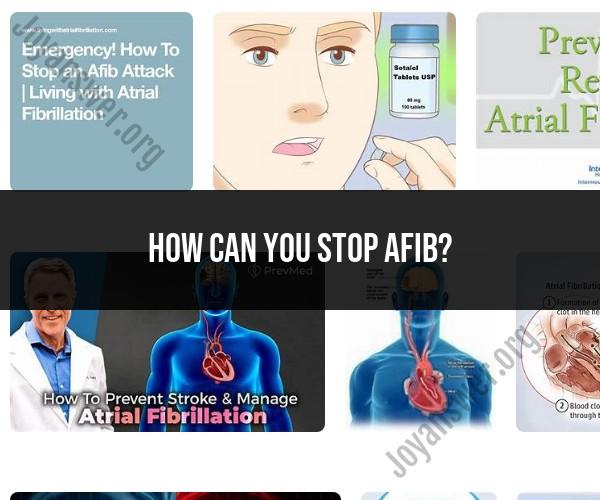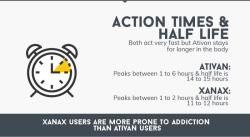How can you stop AFIB?
Atrial fibrillation (AFib) is a heart condition characterized by irregular and often rapid heartbeats. While there is no single cure for AFib, several strategies can help manage and control the condition. The primary goals of AFib management are to control heart rate, restore a normal heart rhythm, and reduce the risk of complications like stroke. Here are some strategies for stopping or managing AFib:
Medications:
- Antiarrhythmics: Medications such as amiodarone, flecainide, or propafenone can be prescribed to help restore and maintain a normal heart rhythm (sinus rhythm).
- Rate Control: Drugs like beta-blockers or calcium channel blockers can slow down the heart rate in people with AFib, making it more manageable.
Cardioversion:
- Electrical Cardioversion: This procedure involves the use of electrical shocks to reset the heart's rhythm to normal (sinus rhythm). It's often performed under sedation or anesthesia.
- Chemical Cardioversion: Medications can be used to convert AFib to a normal rhythm. This approach is sometimes tried before considering electrical cardioversion.
Ablation Therapy:
- Catheter Ablation: During this procedure, a catheter is used to deliver radiofrequency energy or cryotherapy to areas of the heart that are causing abnormal electrical signals. The goal is to create scar tissue and prevent abnormal electrical signals.
- Surgical Maze Procedure: In some cases, AFib may be treated during heart surgery, where surgeons create a pattern of scar tissue on the atria to disrupt abnormal electrical pathways.
Anticoagulation Therapy:
- AFib increases the risk of blood clots and stroke. Anticoagulant medications, such as warfarin or newer oral anticoagulants (NOACs), are often prescribed to reduce this risk.
Lifestyle Modifications:
- Reducing or eliminating alcohol and caffeine intake.
- Managing stress through relaxation techniques like meditation or yoga.
- Maintaining a healthy diet and weight.
- Regular exercise under the guidance of a healthcare provider.
- Managing other underlying health conditions like high blood pressure or diabetes.
Implantable Devices:
- Pacemaker: In some cases, a pacemaker may be implanted to control heart rate and rhythm.
- Implantable Cardioverter-Defibrillator (ICD): If there is a risk of life-threatening arrhythmias, an ICD can be implanted to deliver shocks to the heart to restore normal rhythm.
Stroke Prevention:
- Taking anticoagulant medications as prescribed to reduce the risk of stroke.
- Consult with a healthcare provider to assess your individual stroke risk and discuss appropriate preventive measures.
It's essential to work closely with a healthcare provider to develop a personalized treatment plan for AFib. The most appropriate treatment strategy will depend on factors like the type of AFib (paroxysmal, persistent, or permanent), the underlying cause, the patient's overall health, and individual preferences. AFib management often involves a combination of the above strategies, and treatment may need to be adjusted over time to achieve the best results.
Managing AFIB: Strategies for Stopping Atrial Fibrillation
Atrial fibrillation (AFib) is a type of heart arrhythmia that can cause a number of problems, including blood clots, stroke, and heart failure. There are a number of strategies that can be used to stop AFib, including:
- Medication: There are a number of medications that can be used to stop AFib, including antiarrhythmics, beta-blockers, and blood thinners. The type of medication that is best for you will depend on your individual situation.
- Cardioversion: Cardioversion is a procedure that uses an electrical shock to reset the heart rhythm. Cardioversion can be done either through the chest wall or through the esophagus.
- Ablation: Ablation is a procedure that uses heat or cold to destroy the tissue in the heart that is causing the AFib. Ablation can be done either through the chest wall or through the groin.
Stopping AFIB Naturally: Lifestyle Choices for Heart Health
There are a number of lifestyle choices that can help to stop AFib naturally, including:
- Maintaining a healthy weight: Obesity is a risk factor for AFib, so losing weight can help to reduce your risk.
- Eating a healthy diet: Eating a healthy diet can help to reduce your risk of AFib by lowering your blood pressure, cholesterol, and blood sugar levels.
- Exercising regularly: Exercise can help to strengthen your heart and improve your cardiovascular health.
- Managing stress: Stress can trigger AFib episodes, so it is important to find healthy ways to manage stress.
- Avoiding alcohol and tobacco: Alcohol and tobacco can increase your risk of AFib.
Holistic Approaches to AFIB Control: Natural Solutions
There are a number of holistic approaches that can be used to control AFib, including:
- Acupuncture: Acupuncture is a traditional Chinese medicine practice that involves inserting thin needles into specific points on the body. Acupuncture has been shown to be effective in reducing the frequency and duration of AFib episodes.
- Yoga: Yoga is a mind-body practice that involves a combination of physical postures, breathing exercises, and meditation. Yoga has been shown to be effective in reducing stress and improving cardiovascular health, both of which can help to control AFib.
- Meditation: Meditation is a practice that involves focusing your attention on the present moment. Meditation has been shown to be effective in reducing stress and anxiety, both of which can trigger AFib episodes.
It is important to note that holistic approaches to AFib control should be used in conjunction with conventional medical treatment. If you are considering using any holistic approach to control AFib, be sure to talk to your doctor first.
Conclusion
There are a number of ways to manage AFib. The best approach for you will depend on your individual situation. If you have AFib, be sure to talk to your doctor about the best treatment options for you.













